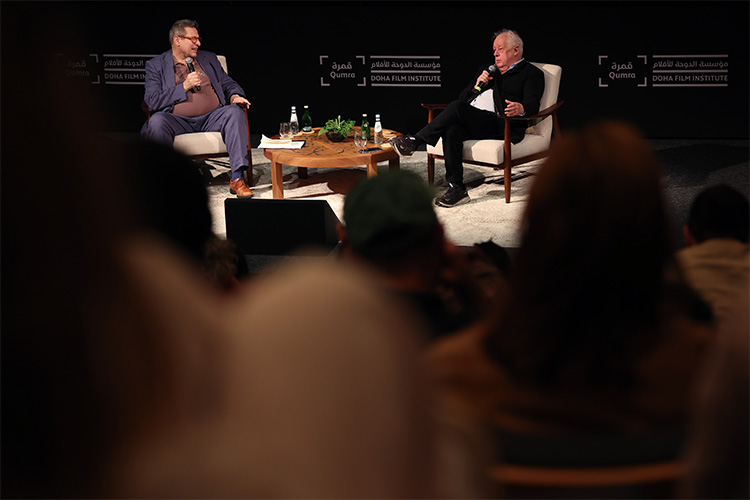Qumra Master Jim Sheridan, the Irish playwright, director and producer whose films have mapped some of the most turbulent periods in Ireland’s modern history, said he sees cinema as projectors of truth and finds a level of “spiritual aggression” in it.
In his Masterclass at Qumra, the annual talent incubator event by the Doha Film Institute, Sheridan had the audience in chuckles with his witty anecdotes and, more often than that, applaud at his candid observations about life and cinema.
The Oscar-nominated director, who established the Dublin Arabic Film Festival in 2014, with Zahara Moufid, to enable Irish audiences to enjoy the best in Arab cinema, said he is “still trying to figure out how to get our message to other people” and to provide unique perspectives on Arab people and culture.
About misrepresentations and propaganda, especially in the wake of current conflicts, and drawing on how he reconstructed scenes of strife in Ireland in his movies, he said: “People don’t realise nonviolence has the same level of intensity as war – it is another way of fighting. Violence is such a self-defeating thing but then people are pushed to it, often because they don’t know what else to do.”
Describing Casablanca as the ‘best propaganda film ever made’ and ‘also the best film ever made,’ he said, “Art can be in the service of the right or wrong. All artists are propagandists, but propaganda has to be in the service of a noble idea to advance humanity rather than to put one side against the other.”
He said Murder at the Cottage, his docuseries “made me question my own beliefs and ways of looking at the world than any of my feature films. You don’t have the kind of control you have like a feature film, but it is very good for investigating yourself.”
Sheridan said his love for cinema started at a young age when he first saw a film projector. “I remember being terrified of it but since then I just became fascinated with the technical aspects of cinema. I still believe the magic of watching a movie on a projector with 24 frames a second is visually and spiritually different. It has a hypnotic effect, and we know there is no manipulation of the images.”
He said the real binary in cinema is not between mentality and narrative – but between “belief and disbelief. If you watch a film and don’t believe it, it crashes.”
Reflecting on the experience of his debut feature, My Left Foot (1989), a biographical film based on the memoir of Christy Brown, who had cerebral palsy, Sheridan said, he was amazed at the care and attention two young men were giving to a handicapped young man he saw in Souq Waqif in Doha “I think people in the Arab culture respect the disabled.”
As a filmmaker, he said he explores emotions that play beyond words, because there is a limit to the spoken word. Sheridan said he prefers not to go by storyboards because he thinks about emotions first. “All emotions are invisible; so, if you are trying to capture the invisible in every visual element, you reduce the freedom of actors to move, and blocks their ability to transfer the emotion in a very precise way.”
On his film, In the Name of the Father, he said he has been greatly influenced by Gillo Pontecorvo’s ‘The Battle of Algiers’. “It was my most favourite movie growing up and I don’t think there has ever since been a movie that reflected the world [of wars] so well. I had that movie to go to [as reference]. You know, you are always standing on the shoulders of giants.”
At the opening of the film in Dublin, Sheridan told the audience that Patrick Conlon, who plays Gerry Conlon’s father was “my father” just as the mother in ‘My Left Foot’ was a nod to his mother. “My father got a big applause. He came up to me on stage, hugged me, and whispered in my ear, ‘I love you.’ That was the first and last time he said that. I didn’t see him again. He died two weeks later.”



